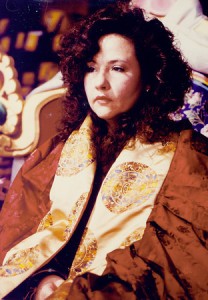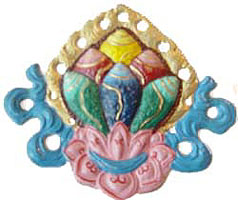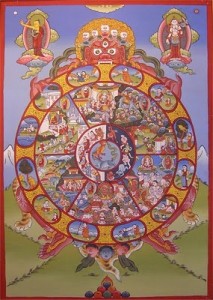
The following is an excerpt from a teaching by Jetsunma Ahkon Lhamo called “Essence of Devotion”
Before I even met His Holiness Penor Rinpoche, who told me I was a Buddhist—I didn’t know this—I had been teaching; and I had been teaching about compassion and the empty nature of phenomena and the empty nature of mind. And you see, I thought that I thought this whole thing up. I thought I had come up with this myself. So smart! Oh well. I thought that what was really missing here was a way for ordinary beings who have been involved in ordinary lives to switch tracks, to come to a place of profound renunciation and acceptance and compassion, and to take a vow that would somehow reach into every future life. I thought the only way to do that was to give them some extraordinary teachings, and make them understand the nature of suffering and the absolute necessity of compassion, and to have them turn their minds in such a way that compassion arose in their minds. In the same way that consciousness appears in the mind, compassion then also appears. And that was my idea—that I had to find a way to do this. So what I did was I began to give a bunch of teachings and eventually called a retreat. And those students that I thought were prepared to go deeper I took on retreat.
We spent a great long time looking at the world and praying for the world and taking responsibility for the world. These students I taught and cajoled and loved and goaded and tricked and manipulated until they would agree to take responsibility for the world and to take responsibility for all sentient beings. They just finally gave up and let me have my way. From that came the writing of a Bodhisattva Vow and I knew that that was the most important turning point and experience in their whole spiritual evolution, and I explained it to them as such. Well, this became a custom. We customarily gave the Bodhisattva Vow. I also began to develop the idea of refuge, of taking refuge in that which brings forth enlightenment, the Buddha nature.
Eventually I met Penor Rinpoche, and he told us that we were Buddhists and that we were practicing Buddhism. I didn’t know anything about Buddhists. I didn’t know anything about anything . Penor Rinpoche came to me and announced to me that I was a Bodhisattva. I was practicing Dharma and I was teaching Dharma and I should keep on teaching Dharma, and I said, “O.K.” Then he gave us the Refuge and Bodhisattva Vows. You see, I had already written this Refuge and Bodhisattva Vow and it didn’t sound anything like what he did because he gave us something in Tibetan! We tried our best to repeat it, but I don’t think it was the same thing. It was a lot more words! So I was kind of a little tense about this and finally when I went to India, I had one of the lamas there translate the Refuge and Bodhisattva Vows and another set of vows that had also been written called the Renunciate Vows for Lay Practitioners, a deeper level of vows. I had them translated into Tibetan and I confessed to my guru, Penor Rinpoche, that I had written these vows and that I had been giving them. I said I didn’t have any other vows and I knew that this was necessary and so, even though these aren’t the traditional vows, I would like your advice on what to do about this. Well, he read the vows and he started laughing and slapping his knee. He thought this was a real gut wrenching hee haw, just laughing and rubbing his knee. Then he said, “About the Refuge and Bodhisattva Vows, if you don’t mind, I think I will continue to give them in the way that I am accustomed to, simply because it’s difficult for a person to learn new tricks. However,” he said, and then he drew himself up to his orthodox lama posture (he is a very orthodox lama), and he said, “I authorize you fully to give these vows.” And he said, “I authorize these vows fully as proper Refuge and Bodhisattva Vows in our lineage.”
That has never happened before. There is a traditional way to give the vows and there is another way, and this is the other way. And at least in the Palyul tradition, he firmly encouraged me to give these vows as often as possible, with teaching. He encouraged me to give them in the way that I have been giving them, because he felt that this is a manifestation of the same vow but done in such a way as to touch the minds and hearts of westerners so that they can remain fully absorbed at that pure moment of ordination which this is. This is an ordination, an ordination of kindness. So he fully acknowledged these as proper vows. That’s why, although they are a little bit different, they are considered to be appropriate, they are considered to be lasting and they are fully authorized in our tradition. A very unusual occurrence, but very important for us as westerners.


